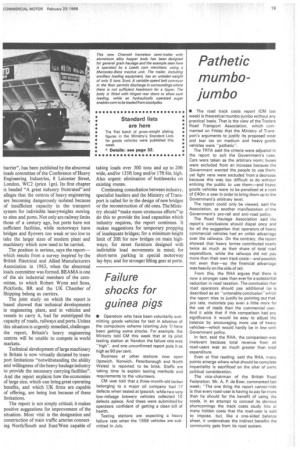Pathetic
Page 21

If you've noticed an error in this article please click here to report it so we can fix it.
mumbo
jumbo
• The road track costs report (CM last week) is theoretical mumbo-jumbo without any practical basis. That is the view of the Traders Road Transport Association, which commented on Friday that the Ministry of Transport's arguments to justify its proposed wear and tear tax on medium and heavy goods vehicles were "pathetic".
The TRTA said the criteria were adjusted in the report to suit the Government's case. Cars were taken as the arbitrary norm; buses were excluded from an increase because the Government wanted the people to use them; yet light vans were excluded from a decrease because this was too difficult to do without enticing the public to use them—and heavy goods vehicles were to be penalized at a cost of fzI-Om a year in order to bring them up to the Government's arbitrary level.
The report could only be viewed, said the Association, as another manifestation of the Government's pro-rail and anti-road policy.
The Road Haulage Association said the report's conclusions should dispel once and for all the suggestion that operators of heavy commercial vehicles had an unfair advantage over the railways_ On the contrary, the report showed that heavy lorries contributed nearly twice as much as their share of total road expenditure, while the railways did not pay more than their own track costs—and possibly not even that—so the financial advantage was heavily on the side of rail.
From this, the RHA argues that there is now a stronger case than ever for a substantial reduction in road taxation. The conclusion that road operators should pay additional tax is described as an "untenable conclusion" which the report tries to justify by pointing out that, pro rata, motorists pay even a little more for the use of roads than the commercial user. And it adds that if this comparison had any significance it would be easy to adjust the balance by encouraging more use of heavy vehicles—which would hardly be in line with Government policy.
In fact, said the RHA, the comparison was irrelevant because total revenue from all road-users was so much greater than total expenditure.
Even at first reading, said the RHA, many points emerge where what should be complete impartiality is sacrificed on the attar of party political consideration.
The vice-chairman of the British Road Federation, Mr. A. P. de Boer, commented last week: "The one thing the report cannot hide is that every road-user is having to pay far more than he should for the benefit of using the roads. In an attempt to conceal its obvious shortcomings the track costs study hits at many hidden costs that the road-user is said to impose, but, like a one-sided balance sheet it undervalues the indirect benefits the community gets from its road system.










































































































